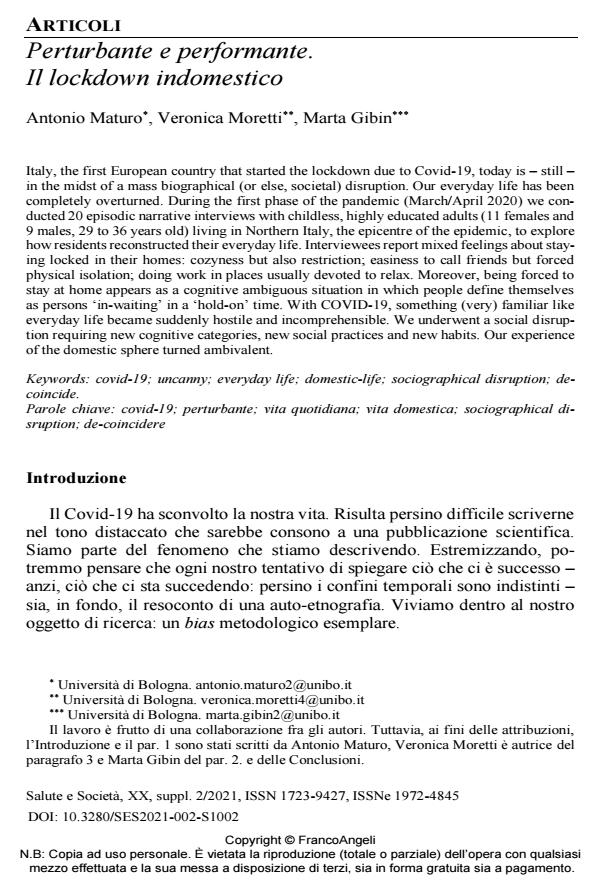Perturbante e performante. Il lockdown indomestico
Titolo Rivista SALUTE E SOCIETÀ
Autori/Curatori Antonio Maturo, Veronica Moretti, Marta Gibin
Anno di pubblicazione 2021 Fascicolo 2021/suppl. 2
Lingua Italiano Numero pagine 14 P. 21-34 Dimensione file 482 KB
DOI 10.3280/SES2021-002-S1002
Il DOI è il codice a barre della proprietà intellettuale: per saperne di più
clicca qui
Qui sotto puoi vedere in anteprima la prima pagina di questo articolo.
Se questo articolo ti interessa, lo puoi acquistare (e scaricare in formato pdf) seguendo le facili indicazioni per acquistare il download credit. Acquista Download Credits per scaricare questo Articolo in formato PDF

FrancoAngeli è membro della Publishers International Linking Association, Inc (PILA)associazione indipendente e non profit per facilitare (attraverso i servizi tecnologici implementati da CrossRef.org) l’accesso degli studiosi ai contenuti digitali nelle pubblicazioni professionali e scientifiche
Italy, the first European country that started the lockdown due to Covid-19, today is - still - in the midst of a mass biographical (or else, societal) disruption. Our everyday life has been completely overturned. During the first phase of the pandemic (March/April 2020) we conducted 20 episodic narrative interviews with childless, highly educated adults (11 females and 9 males, 29 to 36 years old) living in Northern Italy, the epicentre of the epidemic, to explore how residents reconstructed their everyday life. Interviewees report mixed feelings about staying locked in their homes: cozyness but also restriction; easiness to call friends but forced physical isolation; doing work in places usually devoted to relax. Moreover, being forced to stay at home appears as a cognitive ambiguous situation in which people define themselves as persons ‘in-waiting’ in a ‘hold-on’ time. With COVID-19, something (very) familiar like everyday life became suddenly hostile and incomprehensible. We underwent a social disruption requiring new cognitive categories, new social practices and new habits. Our experience of the domestic sphere turned ambivalent.
Parole chiave:covid-19; perturbante; vita quotidiana; vita domestica; sociographical disruption; de-coincidere
Antonio Maturo, Veronica Moretti, Marta Gibin, Perturbante e performante. Il lockdown indomestico in "SALUTE E SOCIETÀ" suppl. 2/2021, pp 21-34, DOI: 10.3280/SES2021-002-S1002